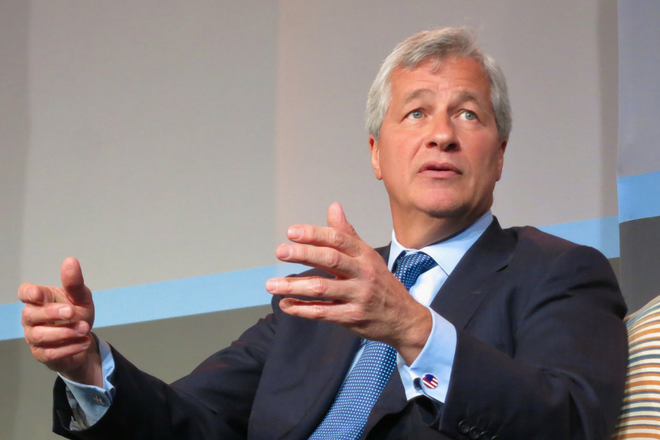JPMorgan: Big name, questionable ethics
JPMorgan represents the creme de la creme of Wall Street. The bank is the largest in the USA by total assets. They are also the 6th largest bank in the world. In 2015, they were also implicated in artificially manipulating the US Dollar. For this, they plead guilty to a felony charge. They have been complicit in the Enron fraud, been implicated in tax fraud and in manipulating the energy sector, and have bribed potential clients in Hong Kong by hiring their family members – these amongst a number of other illicit activities that have made news headlines over the years.
US Senator Elizabeth Warren has had some experience of her own. “I told him that if that happened, “I think you guys are breaking the law.” Suddenly Dimon got quiet. He leaned back and slowly smiled. “So hit me with a fine. We can afford it.””
JPMorgan claims Bitcoin is a fraud
So one can only find it ironic that on September 15, JPMorgan Chase CEO Jamie Dimon denounced Bitcoin a “fraud”. This caused a major currency sell-off and drop in price (especially since it coincided with China’s announcement on the day), but his daughter isn’t the only one cashing in on the currency. Dimon claimed he would “fire in a second” any JPMorgan trader trading the cryptocurrency, because, “It’s against our rules and they are stupid.”
Yet JPMorgan buys and sells Bitcoin
Even so, JPMorgan has been playing intermediary between its clients and Bitcoin XBT. XBT are exchange-traded notes that work to track the price of Bitcoin. (XBT is a mainstream market-friendly Bitcoin acronym.) There was an outcry by the cryptocurrency community when Dimon’s scathing statement and the resulting drop in price was followed by JPMorgan traders buying, on that same day, XBT notes shares to the value of €3 million via Denmark’s Nordnet. Classic trash-it-to-cash-it strategy? Intentional or not, Dimon’s FUD tactics did end up making the bank a nice little commission, brokering a currency their CEO deems a scam. Wonder if the employee(s) in question were, after all, fired?
JPMorgan and cryptocurrency: A midnight tryst?
A spokesperson for the company responded that these were not actions undertaken by JPMorgan. Instead, clients used JPMorgan’s routing funnels to make the transactions themselves. Some believe that JPMorgan would not resort to such underhand tactics for the sake of a few million Euros. However, not everyone is convinced. For one, records of Nordnet trading logs list JPMorgan as the biggest purchaser among all listed banks. Morgan Stanley was another firm on the logs. Its CEO recently said Bitcoin is “more than just a fad“. The names of companies the likes of Barclays and Goldman Sachs also appeared. Many believe that there is more to the investment firm’s relationship with cryptocurrency than they’re letting on. Investopedia suggests there might be a greater convergence between Wall Street and the cryptocurrency world than some investors are disclosing.
JPMorgan’s Bitcoin patent applications
Indeed, the relationship between JPMorgan and Bitcoin is more longstanding than most may realise. Starting in 2013, the company has applied for a “bitcoin alternative” patent in the United States more than 175 times. Their applications have been rejected just as often.
JPMorgan’s blockchain involvement
Not many banks can lay claim to fame with having a Github repo. In fact, few but the technically inclined know what software development platform Github even is. But JPMorgan is not just any financial institution. They do, as a matter of fact, possess over their own Github repository. This forms part of their purposely-built Quorum system, a blockchain-based hyperledger built on Ethereum. Quorum is designed to satisfy regulators who are increasingly getting hot under the collar when it comes to virtual currencies, whilst concealing the identities of parties who do not want details of their financial transactions made public. JPMorgan will reportedly be integrating ZCash technology into its platform. The company’s technical steering committee has also unveiled other hyperledger prototypes like Juno. JPMorgan is also one of the original members of the Ethereum Enterprise Alliance, an organisation that boasts an impressive membership.
JPMorgan’s blockchain trial
The company has implemented a trial run, hoping to use blockchain technology to save on high trading costs. This project is being undertaken in conjunction with Blythe Masters, JPMorgan’s former head of commodities. In the 90s, Masters was instrumental in leading development of JPMorgan’s controversial credit default swaps.
JPMorgan’s blockchain (former) employees
Since leaving JPMorgan for the CEO office of Digital Asset Ventures, Masters is firing up the fintech world with the blockchain. She has essentially traded Wall Street for a Bitcoin-related startup, and believes the blockchain is the future of banking.
In 2014, Masters’ ex-husband, himself a JPMorgan trader, exchanged his seat on Wall Street to bank on Bitcoin. Daniel Masters joined a Bitcoin hedge fund, saying, “The way I see it, Bitcoin is just another commodity, like oil. The state of Bitcoin is a lot like the state of the oil market 25 years ago, where you had a lot of these transactions happening merchant to merchant, this product that everyone wanted and could use but whose prices were very, very volatile, very shaky.”
Bitcoin as proof of work
John McAfee, the creator of McAfee Antivirus (now run by Intel), who mines Bitcoin through his company MGT Capital Investments, retorted in response to Dimon’s statement:
“I’m a bitcoin miner. We create bitcoins. It costs over $1,000 per coin to create a bitcoin. What does it cost to create a U.S. dollar? Which one is the fraud? Because it costs whatever the paper costs, but it costs me and other miners over $1,000 per coin. It’s called proof of work.”
Elsewhere on Wall Street
Dimon’s controversial statement is in sharp contrast to the considerably revised opinion billionaire Oaktree Capital CEO, Howard Marks, recently shared with his investment clients. Stanley Morgan CEO, James Gorman, has also moved to comment positively on Bitcoin.
(Featured image via Steve Jurvetson, used under Creative Commons licence)

